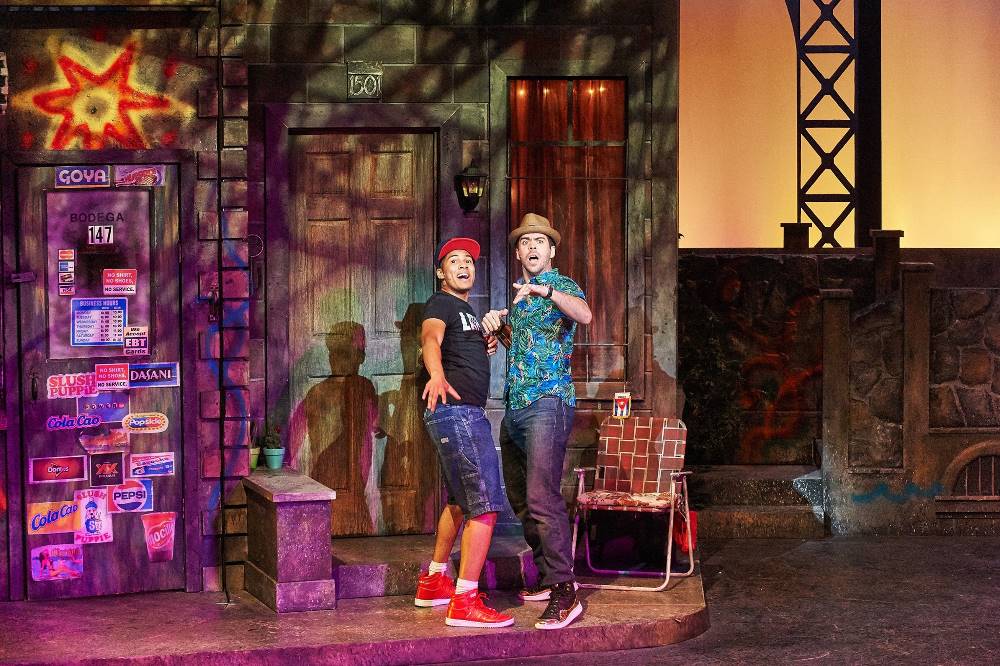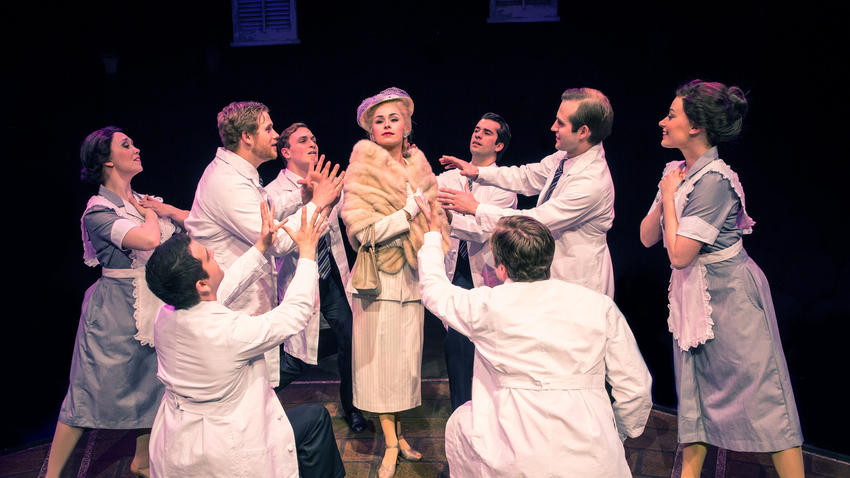Last week, Chicago’s Porchlight Music Theatre released the cast list for its upcoming production of In the Heights, Lin-Manuel Miranda and Quiara Alegría Hudes’s musical set in the predominantly Latino neighborhood of Washington Heights in New York City. Almost immediately, a number of people noticed that while a majority of the cast featured Latinos, the show’s lead and narrator, Usnavi—an immigrant from the Dominican Republic played by Miranda in the original Off-Broadway and Broadway productions—will be played by a white actor, Jack DeCesare. The creative team is also predominantly non-Hispanic white.
This news follows another Chicago casting controversy from earlier this year, when Marriott Theatre announced the cast for its production of Evita, a show set in Argentina, that featured only one Latino actor. Both cases highlight the persistence of what activists call “brownface,” which, similar to the practice of blackface or yellowface, refers to the casting of white actors as Latino characters. (In some contexts “brownface” can refer to white actors being cast as Arab, Middle Eastern, or South Asian characters, as in this current controversy.) Another apt term that groups all these outmoded practices under one shame umbrella: “whitewashing.”
As is customary these days, artists and activists immediately took to social media and to blog posts to vent their dissatisfaction. Wrote scholar and Latino Theatre Commons committee member Trevor Boffone (using one of the gender-neutral variations of Latino and Latina, “Latin@”):
These roles were written by Latin@s for Latin@ actors. The Latin@ community wants their stories told, but in an ethical way that speaks with the community in question. To gentrify In the Heights is to completely miss the point of the musical.
So in case it isn’t clear: Like blackface and yellowface, brownface in a professional context is wrong. Full stop. And while there are some important exceptions (see below), they don’t apply to Porchlight and Marriott, which are Equity signatories and hence are professional. There is no viable excuse for this kind of whitewashing anymore, least of all—in a city as diverse as Chicago—the “not enough actors” excuse.
I reached out to Porchlight to verify the ethnic backgrounds of the show’s actors and received this in response (which uses the other gender-neutral form of Latina/o, “Latinx”):
While Porchlight specifically encouraged artists who self-identified as Latinx to audition for In the Heights both in our [Actors’ Equity] and non-union audition announcements, we did not invite nor require potential employees to state their racial self-identification as part of our hiring practices.
Indeed, the casting announcement on the AEA website said the theatre was “especially seeking actors/actresses who identify as Latino.” But while ethnicity was a factor in their casting of In the Heights, it clearly wasn’t the overriding concern.
Of course, the term “Latino” does not explicitly describe a race; Latino designates an ethnicity, which is more of a language and geographical designation and thus can span many races. And the characters in In the Heights come from a variety of nations—the Dominican Republic, Cuba, Puerto Rico, and more. So what in fact is the official casting requirement for the show?
I contacted Rodgers & Hammerstein, which licenses In the Heights. According to Dana Siegel, the vice president of marketing and development at R&H, the ethnicities of the characters are defined in the script, and it is up to professional productions to “cast appropriately.” This doesn’t mean that only Cuban actors can play Cuban characters, necessarily, but the show should be cast in a way that upholds “the story’s integrity….The author’s intention is listed on the page, and it is your responsibility to reflect the author’s intentions,” Siegel explained. If the author’s stated intentions include a specific race and ethnicity, changing that is tantamount to changing the text (as the Dramatists Guild made very clear last year).
The same guidelines apply to amateur and school productions, though they’re not always upheld. But Hudes, who wrote the show’s book, told me she’s not worried about non-professional productions. “I’m happy for schools and communities who do not have [Latino] actors on hand to use In the Heights as an educational experience for participants of all stripes,” she wrote in an email. (It’s important to note that while Hudes doesn’t expect non-professional productions to adhere strictly to the show’s ethnicity, this is a different stance from playwrights Katori Hall and Lloyd Suh, who have made it clear that their shows The Mountaintop and Jesus in India, respectively, shouldn’t be whitewashed, even in an educational context. The moral: When in doubt, check with the creators.)
But for professional productions, Hudes is clear: “Casting the roles appropriately is of fundamental importance.” After all, she and Miranda wrote the show in part to create complex roles for Latino actors, because, as she put it, “For decades, the vast majority of Latino roles were maids, gangbangers, etc. It’s demoralizing, obnoxious, and reductive of an entire people. It’s a lie about who we are, how complicated our dreams and individuality are.”

When one of these cases comes to light, the response from the offending theatre usually goes something like this: “We worked hard to find the right actors for this show, and we can only cast based on who shows up.” Marriott Theatre executive producer Terry James did a variation on this theme regarding Evita, telling the Chicago Tribune, “If we had our choice, the entire cast would be Latino. It’s not a conscious choice. We can only cast the actors that audition for us.”
Hispanics/Latinos make up 29 percent of the Chicago population (roughly the same percentage as New York City, where In the Heights originated). There are a number of Latino theatre companies there (including Teatro Vista and Teatro Luna); the Goodman Theatre regularly holds a Latino Theatre Festival; and Latino Theatre Commons held its 2015 Carnaval of New Latina/o Work in Chicago. Is the talent pool really not deep enough?
But let’s grant, for the sake of argument, that not enough actors of the required ethnicity show up at your audition. What are you supposed to do? Hudes has a few suggestions.
“You cannot just put out a casting call and hope people come and then shrug if they don’t show up,” she said. “You may need to add extra casting calls (I do this all the time), go do outreach in communities you haven’t worked with before. You may need to reach out to the Latino theatres and artists and build partnerships to share resources and information. You may need to fly in actors from out of town if you’ve exhausted local avenues, and house them during the run.”
She conceded, “When faced with these expensive obstacles, an organization’s status quo sometimes wins because it’s cheaper and less trouble.” But that’s not good enough, she said: “The Latino community has the right to be disappointed and depressed that an opportunity like this was lost.”
Perhaps Porchlight, Marriott, and other theatres around the country should take a page from Atlanta Lyric Theatre. After a production of West Side Story at the theatre in which some of the Puerto Rican roles were cast with white actors, the theatre officially promised to cast only actors of color in roles of color in the future, as Howard Sherman reported in the Arts Integrity Initiative. The theatre’s statement reads:
Moving forward, it is the policy of Atlanta Lyric Theatre that ethnically specific casting, or the casting of any other actors of color, will occur in those shows in which ethnicity is a central component to the telling of the story. Additionally, the Lyric will continue its policy of considering people of all backgrounds for roles that are not ethnically specified.
Atlanta obviously has something going on: Aurora Theatre is currently staging In the Heights in a coproduction with Theatrical Outfit that is, from most reports, cast ethnically appropriately. Perhaps some Atlanta actors could travel to Chicago, if theatres there can’t find enough Latinos?
If all else fails, it’s fine to not mount the show if you can’t do it the way its creators intended. Because when it comes to a choice between whitewashing roles of color or having no production at all, the latter is preferred. Audiences and artists are tired of apologies for business as usual. They—and we—are ready for theatres to do better, to commit to authenticity, and to stop making excuses.
Edited to add. Two hours after we posted up this piece, Porchlight Theatre released a statement to us, which we’ve reproduced in full below.
To our colleagues in the Chicago Theatre community, please know that we at Porchlight Music Theatre have been intently listening to and have clearly received the messages of concern regarding our upcoming production of In the Heights.
The thoughts that have been expressed are accepted with the utmost seriousness and consideration, and we humbly wish to contribute to this needed conversation.
In the casting of In The Heights, as with all productions at Porchlight, we did not invite nor require potential employees to state their racial self-identification as part of our casting and hiring process. All actors who attended were considered based solely on the content of their audition.
Our continual objective is to create and encourage an environment of inclusion in all our work here at Porchlight Music Theatre.
Moving forward, we are committed to expand our efforts in regard to inclusion and representation as well as furthering our relationships with the diverse talent and institutions that make up the Chicago Theatre community.
Porchlight Music Theatre




